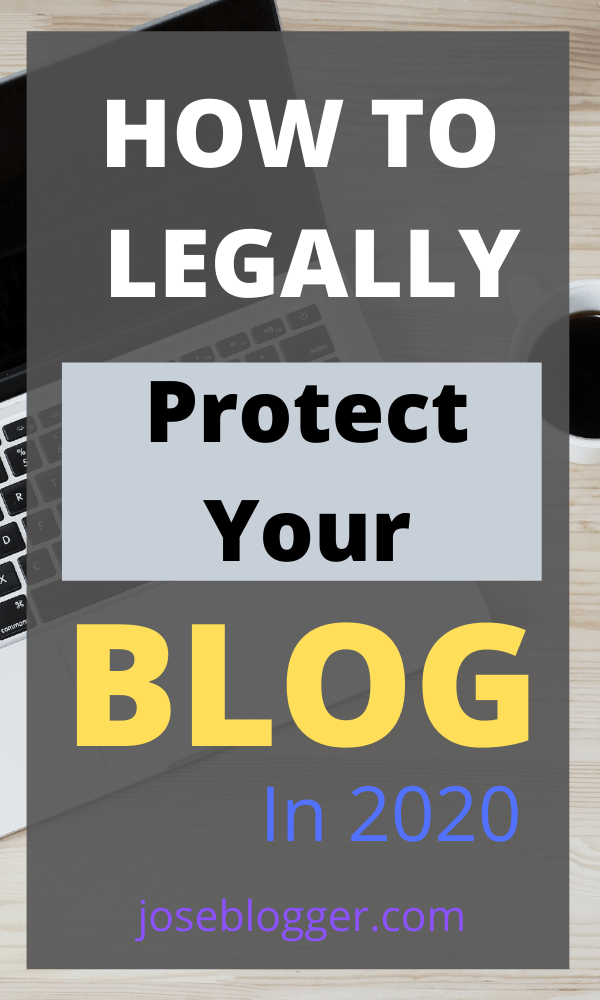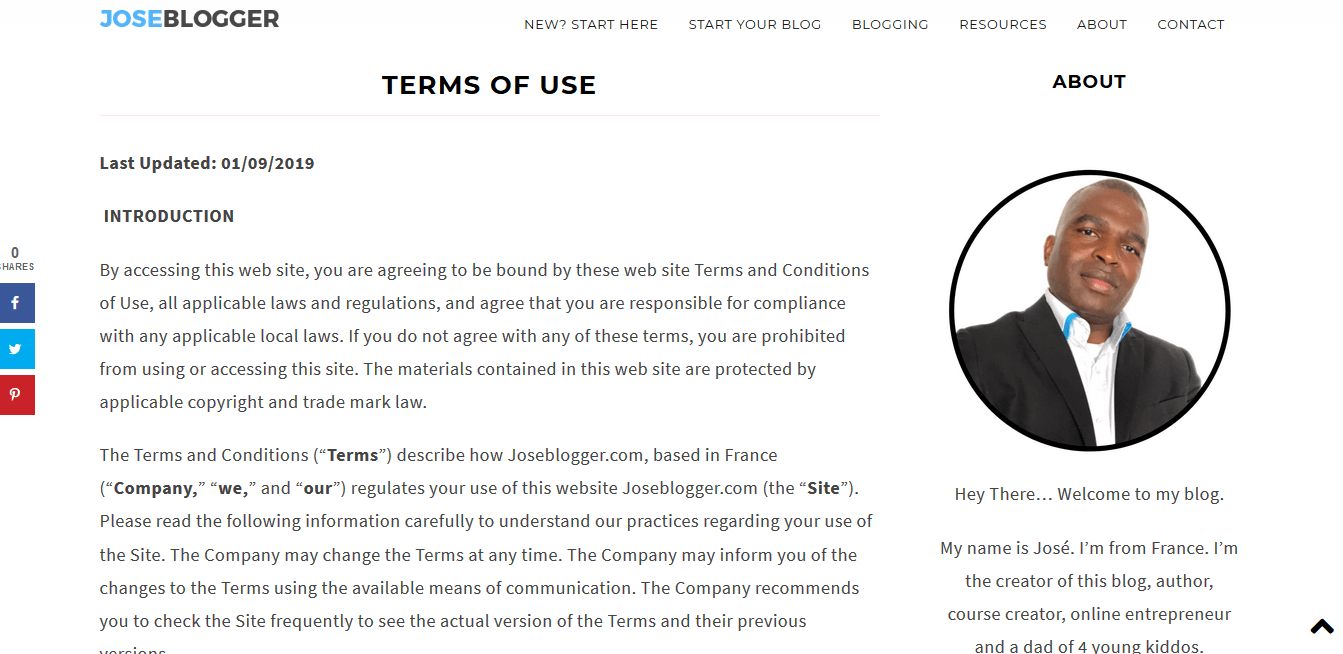In this article, I’m going to talk about a very important element that most online entrepreneurs ignore or neglect … until it’s too late!
So what is it all about?
Well, I’m just going to talk to you about the importance of legally protecting your online business.

If you are reading this article, this topic certainly interests you and concerns you at the highest level. So, please read on until the end so you can sleep better at night knowing that your online business is legally protected.
But before we get into the thick of it, let me ask you a few questions first: Do you have a blog, a website, or an online business?
If you answered “Yes” to this question, have you ever wondered if your blog, your website or your online business altogether is legal and compliant with the different laws of your country? With the laws of the United States of America? And with European laws?
As a web entrepreneur, maybe you tell yourself that these things don’t concern you. That the law is for others. You, all you are interested in is developing your business, driving traffic to your website and selling your products to make money as fast as possible.
I can perfectly understand you. However, you should not ignore the law.
No matter what you do online, you have to take the legal side of your business seriously. For example, does your blog or your website has:
- A Privacy Policy Page?
- A Disclaimer Page?
- A Terms and Conditions Page?
- A GDRP Page?
You see, many bloggers and online entrepreneurs run a successful online business but they don’t even have these legal pages on their website.
Don’t be like them!
You should definitely think about legally protecting your business before you get into legal problems or before authorities such as the FTC fine you for not complying with the CAN-SPAM Act, GDPR, CCPA and many other laws.
So, how can you protect your business when you’re not a lawyer yourself? What do you need to have on your website to make it legal?
Disclosure: “Listen! Before you continue reading what I’m talking about below, I want to disclose that my advice is just for informational purposes only. I’m not a lawyer and you can’t take my advice for granted. It’s up to you to do your own research before using this advice on your own blog/website.”
Honestly, to protect your business you don’t need to be a lawyer. You don’t even need to spend a fortune to hire an expensive lawyer to write your legal pages for you and you don’t need to spend days and nights learning the ropes so you can do it yourself.
If you want to protect your blog or your business, all you need is to have the 3 legal pages I mentioned above on your website. Now, to have these legal pages, you have 4 options.
Option 1: You can write your Privacy Policy Page, Your Disclaimer Page and your Terms and Conditions Page yourself or use some free legal templates. But in my opinion, if you don’t know what you’re doing this is not the best option because if you write your legal pages yourself and make some mistakes or forget to mention some important information, you could also get into trouble.
Option 2: You can go on other websites similar to your website and just copy their legal pages. But if I were you, I would not do that because not only stilling other people’s work without their permission is bad, but you could also get in trouble for copyright infringement if they come to find out.
Option 3: You can hire an expensive lawyer/expert to write your legal pages for you.
Option 4: You can invest in lawyer drafted legal templates that are well-written to protect your blog legally without having to pay an arm and a leg.
If you feel like option 4 is the best option for you, then you are at the right place because this is where Amira’s Legal Bundle comes in.
What is the Legal Bundle and what are you going to find inside?
” The Legal Bundle is an instant download of Amira’s 3 best selling legal templates + 9 bonuses you need to comply with the laws, avoid CCPA and GDPR fines and sleep peacefully at night knowing your online business is protected legally. This Legal Bundle is trusted by over 10,000 entrepreneurs and clients that Amira has helped as a lawyer for more than 9 years. “
In a nutshell, the Legal Bundle contains the 3 most important pages you need to have on your website.
Who is Amira and why should you listen to what she has to say?
Amina is a business lawyer, six-figure blogger and coach from Florida who teaches you how to protect your online business legally. She is the founder of the blog aselfguru.com.
In the last 9 years, she has helped over 10,000 entrepreneurs like you with her affordable legal templates and service.
If you want to better get to know her and see how she can help you protect your online business legally, please watch the video below:
Legal Bundle for your website by Amina from aselfguru.com
Creating a blog to publish in your niche is one of the best ways to become known.
But if you want to protect your blog and have it stay updated, you need to follow certain steps and legalities. You can choose the option to do it yourself or you can just hire someone to do it for you.
Many people choose to do it themselves because they are very good at setting up blogs and creating internet marketing pages. However, if you need an expert to help you, then hiring someone is a great idea.
A legal document such as the ones you’ll get inside the Legal Bundle should be created with all the necessary information on how to legally protect your blog. There are some websites out there that will allow you to download such legal documents. Just take the time to search for the right website.
Since you are not a legal professional, you don’t want to do it by yourself as I told you earlier. If you want to avoid all these hassles that come with researching and writing all your legal pages and if your budget allows you to hire a lawyer or a legal expert to do it for you, do it. You won’t regret it!
There are many reasons that may push you to create a blog of your own. You can actually create a blog and use it to promote your products and services or you can use it as a place where you can learn about a certain subject. Whatever your reason, you need to protect your blog with proper legal measures.
Today, blogs are easily accessed by all social networking sites and the common people. So if you want to protect your blog, you must ensure it stays legal to avoid lawsuits and build trust with your audience.
Why do you need to legally protect your blog or your website?
As I told you, you must protect your website if you want to sleep in peace.
Secondly, if you want to run paid traffic on your website such as Facebook Ads, Bing Ads or Google AdWords, these companies will check that you have at least a “Privacy Policy” page on your website before they allow you to start using their networks.
Without these legal pages, they may deny your campaign or even ban your ad account.
To make sure that your blog or your website is fully compliant with the different laws that regulate the Internet, your website must have some very important pages in place.
You also need to make sure that your site is GDPR compliant and that it follows all the rules below:

If you look on my blog for example and if you scroll until the bottom, you will see some of these legal pages I have on my website.
Here’s how these legal pages look like on my website.

As you can see on the screenshot above, the first legal element people see when they visit my blog is that black banner that says:
“This site and it’s third parties use cookies to improve our service, track analytics, remember preferences and or offer you better services. By visiting this site you accept these cookies. Click the “Read More” link to read our privacy and cookie policies.”
With that banner, I want to disclose that my blog uses cookies. People are therefore free to continue visiting my blog if they agree with the fact that we use cookies… or to leave if they do not agree.
If they want to find out more about how my blog uses cookies, they still have the option to click on the read more link to visit my “cookie policy” page.
Then I have most of my legal pages that look like this:

And when they click on one of these links, let’s say they click on my “Terms of Use” link, here’s what they can read about my Terms of use policy:

There are several reasons why you need to protect your website legally.
Firstly, people now rely on the internet for their day to day operations and it is important that they feel safe and secure when accessing the internet.
Also, it’s important to know that there are many companies and individuals out there that try to pull down their competitors with legal action. It is important that you are fully aware of all the laws relating to using the internet and the laws that are enforced by the government of your country.
When you comply with the law then you will not be breaking any rules but this is not always the case and it is necessary to ensure that you are compliant with the rules and regulations.
Secondly, if you do not comply with the laws then there is a chance that you could be sued by a competitor. This is not something that will be good for you at all and it is important that you understand the regulations and laws relating to your website.
Another reason why you need to protect your website legally is that this will help you avoid fines for non-compliance.
A site that is not protected legally will attract fines that can be very expensive.
Finally, you need to protect your website from the various threats that can affect your site. There are many threats such as spam, viruses, security holes, illegal materials, and even phishing.
All of these factors need to be understood by all involved in the site so that you can get them protected in a legal way.
Do you like what you’re reading so far? So, please make sure to subscribe to my blog below so we can keep in touch.
Conclusion
In this article, we discussed the importance of protecting your website by having the appropriate legal pages on your website.
A legal page will help to get more people to visit your website while being 100% compliant with all the laws related to running an online business. However, the pages should be attractive and have all the information that your visitors might want to know about you.
For instance, you can create an “About Me” page and add a good description of your business and give a good explanation of what you do.
Your “Terms and Conditions” page has to include the name of your company and the postal address if you have one. You also need to put a link to your landing page or blog where the visitors can go and read your articles or find out more about how you can better help them.
There are several benefits that can come from having legal pages for your website. The first benefit is that it will increase the traffic to your website as your website will be seen as a legitimate business by the partners you’ll be working with and also by the search engines such as Bing or Google.
With more traffic comes more chances for sales and so, more money for you. You will also be able to get more clients.
But as I told you, you have to ensure that the legal templates you create for your website are professionally designed.
Do not be afraid to invest in this lawyer approved legal bundle because it will help you make your pages more professional.
Get the Legal Bundle Templates Here…
So, are you blogging legally? Did you have a chance to buy Amira’s Legal Bundle for your website?
How did this legal bundle help you in your business?
Please comment below and share your experience.

